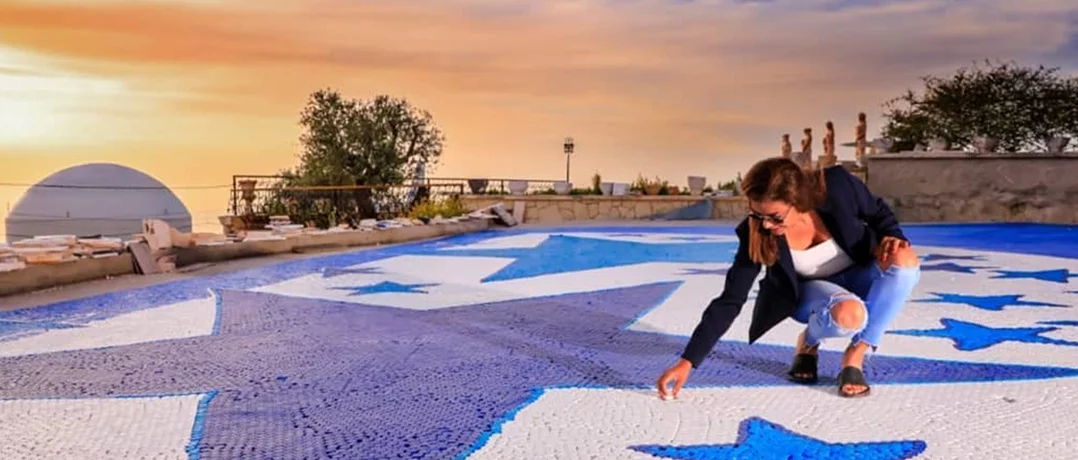From hiding bottles under a staircase to breaking six Guinness World Records, Lebanese eco-artist Caroline Chaptini has turned discarded plastic into monuments of hope, unity, and strength, one recycled dream at a time.
Caroline Chaptini: Turning plastic into purpose
Caroline Chaptini: Turning plastic into purpose


The first time I met Caroline Chaptini was more than six years ago, in Bnachi. She stood before a mountain of empty plastic bottles, eyes sparkling with conviction.
What most people saw as waste, she saw as a possibility. I had brought her a few bags myself, eager to contribute to the Christmas tree she was building entirely from recycled bottles. Under the winter sun, she stacked them patiently, bottle by bottle, as if each one carried a promise of change.
I didn’t realize then that I was watching the start of a quiet revolution.
From bottles under the stairs
“I never planned to be an artist,” Caroline tells me, laughing softly. “It started when I wanted to get rid of my pregnancy weight. My dietitian told me to drink a lot of water to lose weight, so I used to collect the bottles under the stairs at the shop where I worked. I thought I’d call a recycling company, they never came. One day, I told my daughter Sophie, who was nine, that we should make something together. That’s how we built our first Christmas tree. It was two meters tall, made from five hundred bottles, red with cotton inside. People saw it and said, ‘How beautiful!’ That’s when I realized I had this hobby I never knew existed.”
Caroline had studied accounting, not art or design. “I started searching online: what can you make from plastic? I saw that Mexico had made the largest Christmas tree, and honestly, it was ugly. So, I said, I’ll make something more powerful.”
Breaking records, building bridges
Born in Miziara, in north Lebanon, she faced skepticism from all sides. “They called me Abu Ibrahim,” she recalls with a wry smile. “They said, ‘She collects garbage.’ Even my friends and sisters laughed. I was divorced, I had a daughter, and people said, ‘What are you doing with this plastic?’ But when I won my first Guinness World Record, they all said, ‘We’re proud of you.’”
She pauses, then adds, “They used to call me a divorced woman. Then they called me a Guinness woman. I had three world records in one year.”
For Caroline, success was never just about scale, it was about message. “When I made the Crescent during Ramadan, I wanted to show that we have no sects in Lebanon. I’m a Christian woman, and I made the Crescent. After my Christmas tree, it was my way of saying that unity is possible.”
The Crescent, built during the COVID-19 lockdown, remains one of her proudest works. “It was the hardest,” she admits. “No volunteers were allowed. I had no sponsor, no glue, no nylon. I worked alone, in the water and the heat. It was one hundred sixty-nine square meters. I did it in one month. I say it proudly, I’m a hero. Not because I broke a record, but because I did it all by myself.”
When the Beirut Port explosion struck, her mission took on new urgency.
I said to myself, I have to give hope to the Lebanese people. So, I made the Guinness flag, the Lebanese flag built entirely from recycled plastic. It was my way of saying that even in destruction, something can still rise.
The ministry of plastic
Her projects are not only art but acts of environmental repair. “Each project collects around five tons of plastic,” she says. “I donate the bottle caps to children with cancer because plastic equals money. Every project is a way to clean the country, to teach, to give hope. I always say I’m running a ministry, the Ministry of Plastic,” she adds, laughing.
Over the years, she has built trees, moons, crescents, and now dreams of her next piece, a 10-meter-tall Cedar of Hope made from 10,462,000 green bottles, one for each square kilometer of Lebanon. “It will stand for life, for our land, for the idea that we can grow again.”
Her initiatives have drawn schools, volunteers, and entire towns into action. “Children tell me, ‘I’m part of your Guinness World Record!’ They collect bottles from their neighborhoods. It changes their mentality. That’s the real achievement, not the certificate, but the awareness.”
Faith, resilience, and love of country
Despite invitations to take her art abroad, Caroline insists her heart remains in Lebanon. “I can do my projects elsewhere and make money, in Dubai, I once won $20,000. But I want to make all my Guinness World Records here. Because Lebanon is love. It’s home.”
She often works through nights of exhaustion, carrying her own ladders and tools. “Sometimes I cry from tiredness,” she admits.
But then a child smiles at me, and I remember why I’m doing this. I’m not only building art, I’m building faith.
Her message to young people is simple:
If there’s a will, there’s a way. Keep walking. Keep dreaming. Nothing will stop you if you dream.
Standing beside her today, I think back to that first day in Bnachi, to the small pile of bottles I once brought her, and how it became part of something far larger. Caroline Chaptini turned plastic into poetry, waste into witness. In a country often buried in its own debris, she continues to build what we need most: faith in our ability to start again.


